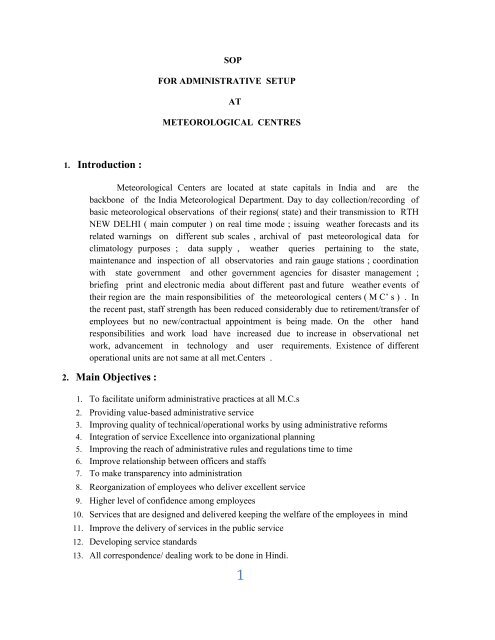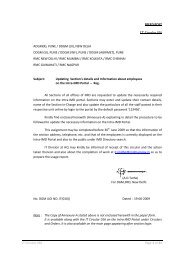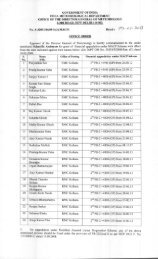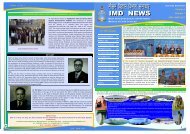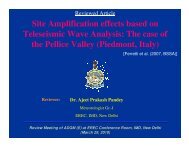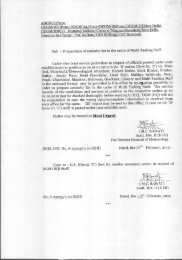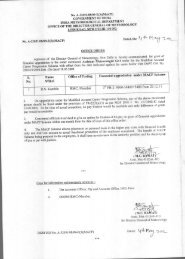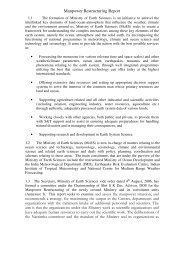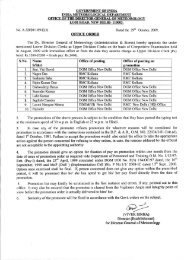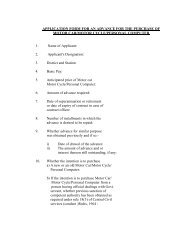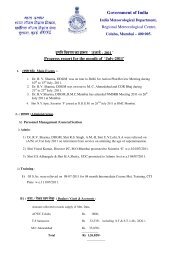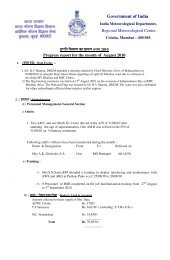1. Introduction - METNET : An e-Governance Intra-IMD Portal - India ...
1. Introduction - METNET : An e-Governance Intra-IMD Portal - India ...
1. Introduction - METNET : An e-Governance Intra-IMD Portal - India ...
Create successful ePaper yourself
Turn your PDF publications into a flip-book with our unique Google optimized e-Paper software.
SOP<br />
FOR ADMINISTRATIVE SETUP<br />
AT<br />
METEOROLOGICAL CENTRES<br />
<strong>1.</strong> <strong>Introduction</strong> :<br />
Meteorological Centers are located at state capitals in <strong>India</strong> and are the<br />
backbone of the <strong>India</strong> Meteorological Department. Day to day collection/recording of<br />
basic meteorological observations of their regions( state) and their transmission to RTH<br />
NEW DELHI ( main computer ) on real time mode ; issuing weather forecasts and its<br />
related warnings on different sub scales , archival of past meteorological data for<br />
climatology purposes ; data supply , weather queries pertaining to the state,<br />
maintenance and inspection of all observatories and rain gauge stations ; coordination<br />
with state government and other government agencies for disaster management ;<br />
briefing print and electronic media about different past and future weather events of<br />
their region are the main responsibilities of the meteorological centers ( M C’ s ) . In<br />
the recent past, staff strength has been reduced considerably due to retirement/transfer of<br />
employees but no new/contractual appointment is being made. On the other hand<br />
responsibilities and work load have increased due to increase in observational net<br />
work, advancement in technology and user requirements. Existence of different<br />
operational units are not same at all met.Centers .<br />
2. Main Objectives :<br />
<strong>1.</strong> To facilitate uniform administrative practices at all M.C.s<br />
2. Providing value-based administrative service<br />
3. Improving quality of technical/operational works by using administrative reforms<br />
4. Integration of service Excellence into organizational planning<br />
5. Improving the reach of administrative rules and regulations time to time<br />
6. Improve relationship between officers and staffs<br />
7. To make transparency into administration<br />
8. Reorganization of employees who deliver excellent service<br />
9. Higher level of confidence among employees<br />
10. Services that are designed and delivered keeping the welfare of the employees in mind<br />
1<strong>1.</strong> Improve the delivery of services in the public service<br />
12. Developing service standards<br />
13. All correspondence/ dealing work to be done in Hindi.<br />
1
3. Duty Roster:<br />
(i)<br />
(ii)<br />
(iii)<br />
(iv)<br />
(v)<br />
Duty roster of all general and operational duty personnel may be maintained. Weekly off<br />
day of each official may be marked against his/her roster. Duty roster for succeeding<br />
month should be prepared for use on last working day of the month.<br />
Leave of any kind may be recorded against concerned official’s roster.<br />
All duty rosters will be under control of A.M.(Admin) and it should be initialed by<br />
A.M.(Admin) as well as Dir. I/C on last working day of the month.<br />
Officials dealing technical / administration on general duty should be drafted to<br />
operational units in case of shortage of staffs or at the time of adverse weather such as<br />
cyclone/active monsoon period on c-off basis in case the day been declared holiday.<br />
A.M.(Admin) will be responsible for duty allotment against officials on leave especially<br />
on operational unit and on his off days/holidays, duty officer will make necessary duty<br />
allotment in case required on emergency, he can consult with A.M.(Admin) over phone if<br />
he is available at the station otherwise with Dir. I/C.<br />
4. Attendance:-<br />
(i)<br />
(ii)<br />
(iii)<br />
(iv)<br />
(v)<br />
(vi)<br />
To make more punctual and sincere of the employees, two bio-metric machines should<br />
be installed in each M.C..<br />
Till installation of biometric machines, two attendance registers will be used in each<br />
M.C.. One register for general duty personnel i.e. fixed duty hours under the supervision<br />
of A.M.(Admin) /Admin officer, another for roster duty personnel under supervision of<br />
Duty officer.<br />
Dir.I/C will countersign Attendance register once in a week preferably first working day<br />
of the week for 1st and 2nd category<br />
Separate attendance register for Gaz. Officers (Roaster and General duty) under<br />
supervision of A.M.(Admin)/Admin officer but Dir. I/C will countersign everyday<br />
Attendance register should be one for an year and it should begin from 1 st January and<br />
end on 31 st December of the year<br />
Late arrival may be recorded and leave may be asked as per rules ( Appendix –I).<br />
2
5. Leave:<br />
(i)<br />
(ii)<br />
(iii)<br />
(iv)<br />
(v)<br />
(vi)<br />
(vii)<br />
(viii)<br />
(ix)<br />
(x)<br />
(xi)<br />
Earned Leave should be applied 15 days in advance to manage duty roster.<br />
Recommendation of leave should be forwarded to concerned R.M.C. well in advance<br />
Sanction of E.L. should be communicated by R.M.C. before the commencement of leave<br />
and regularization of leave should be within two months<br />
E.L. application should be recorded in a register for each individual and regularization of<br />
leave in the remarks column against the official may be entered as & when received from<br />
R.M.C.<br />
C.L. account may be maintained for each year against each official and more than 5 days<br />
C.L. should not be granted at a time. For more than 5 days C.L., approval of concerned<br />
D.D.G.M. of R.M.C. may be sought. Separate C.L. account register for Gaz. & non-Gaz.<br />
Employees. C.L. should be availed only after approval of the Dir. I/C as far as possible<br />
Comp.off can not be availed more than two days at a time with prior approval of Dir. I/C.<br />
C.off earned performing extra duties should be availed within a month from the date of<br />
earning at the place of posting station.<br />
C . off will have to be availed at the place of posting only otherwise these will be<br />
lapsed.<br />
Commuted leave may be recommended on request of employees but he/she has to submit<br />
fitness & medical certificates at the time of joining otherwise joining should not allowed.<br />
The officials should communicate his inability to the office while proceeding on medical<br />
leave.<br />
Extension of leave will be sought on written application/request but no telephonic<br />
information will be entertained for extension of leave.<br />
C.L. can not be combined with E.L. or commuted leave<br />
Special casual leave will be granted to employees in case of curfew/bandh irrespective of<br />
distance from residence to office.<br />
Rules regarding leave will be followed ( Appendix –II)<br />
6. Work Diary:<br />
All group C staff in general duty ( i.e. fixed duty hours in the week) should maintain<br />
diary for daily assigned work and it will be verified daily by section I/C . The diary will<br />
be brought to the notice of Dir. I/C once in a week for his/her signature.<br />
3
S.No.<br />
Particulars of dak<br />
received<br />
Number Date<br />
From whom<br />
received<br />
To whom<br />
Remarks<br />
1 2 3 4 5 6<br />
(v)<br />
(vi)<br />
All letters received will be entered in receipt register and issued to concerned Assistant of<br />
the section with signature and date.<br />
Each section / unit will maintain separate receipt/dak registers and status of action will be<br />
indicated in the remarks column. Format is given below:<br />
7. DAK register:<br />
(i) 'Dak' includes every type of written communication such as letter, telegram,<br />
interdepartmental note, file, fax, e-mail, wireless message which is received, whether by<br />
post or otherwise, in any department for its consideration.<br />
(ii) All daks will be received in General Section by Admin. Section staff ( either LDC or MA)<br />
and all daks( speed post / registered latter / latter marked to Director) should be opened<br />
in presence of Dir.I/C by the concerned staff.<br />
(iii) After initial of Dir. I/C, all daks will be shown to all Group ‘A’ officers and section I/C s<br />
posted at M.C.<br />
(iv) Dak/Receipt register may be prepared in the following format:<br />
Date:-<br />
Date:-<br />
Sr.No Diar<br />
y<br />
Number &<br />
date of receipt<br />
From<br />
whom<br />
Brief<br />
subject<br />
To<br />
whom<br />
File<br />
No.<br />
Replied to No reply<br />
was<br />
Remarks<br />
No. Numbe<br />
r<br />
Date<br />
marked In<br />
Hindi<br />
In<br />
English<br />
necessar<br />
y<br />
1 2 3 4 5 6 7 8 9 10 11 12<br />
8. Dispatch Register:<br />
Dispatch register will be maintained in the following format and stamp account may be<br />
indicated in the respective column. The centers where franking machine is used, frank<br />
the cover instead of affixing stamp and its value may be entered in the column<br />
accordingly.<br />
S.No.<br />
Number of<br />
communication<br />
Addressee<br />
Value of stamps<br />
affixed<br />
4
Non-postal communications will be sorted out according to the location of the<br />
addressees, entered in messenger books and handed over to messenger for delivery to<br />
the addressees. Messenger books will be numbered serially. Name of messenger may be<br />
indicated and also signature of recipient may be ensured.<br />
9. Service Postage stamp Register:<br />
The dispatcher will maintain an account of the postage stamps in the format given below.<br />
Signature of A.M. (Admin) may be made as & when stamps are received and entered in<br />
the stamp account register.<br />
Stamps Account Register<br />
Date<br />
In hand<br />
the<br />
the day<br />
Value of stamps<br />
Received<br />
during<br />
Used<br />
during<br />
the day<br />
Balance at the<br />
close of the day<br />
( cols. 2+3+4)<br />
Signature of<br />
Dispatcher A.M.(Admin)<br />
Franking machine account will be maintained in the similar procedure.<br />
10. File Register:<br />
A record of files opened during a calendar year will be kept in a file register to be<br />
maintained by the diarist. A list of approved standard heads along with the serial numbers<br />
identifying them should be pasted at the beginning of the register. The pages allotted to<br />
the standard heads in the registers should also be indicated against each. Electronic file<br />
register will also be maintained in a computer environment. The format of file register is<br />
given below:<br />
File Register<br />
Standard Head No:-<br />
Standard Heading :-<br />
File No.<br />
Subject<br />
Date of<br />
Opening<br />
Closing<br />
Classification<br />
(and year of<br />
review)<br />
Remarks<br />
A proper file numbering system is essential for convenient identification, sorting,<br />
storage and retrieval of papers. For opening files relating to establishment, finance,<br />
budget and accounts, office supplies and services, and other house-keeping jobs common<br />
to all departments, the standardised functional file index including its file-numbering<br />
5
system, issued by the Department of Administrative Reforms and Public Grievances will<br />
be followed. The file numbering should be in subject classification with standard heads,<br />
i.e. main subject headings concerning it; and (b) standard sub-heads, i.e. aspects of the<br />
main subject headings. The standard heads will bear consecutive serial numbers. No such<br />
numbers, however, will be allotted to standard sub-heads.<br />
File register will be maintained by General Admin section and the number will be<br />
allotted to each file of every unit depending on their subject of work of the unit but the<br />
procedure will be followed with head etc. as mentioned above. The file is numbered<br />
consecutively as 3/1/2000-SR,3/2/2000-SR and so on, where `SR' represents the section.<br />
Separate file register can be maintained in each unit whereas file numbers of all the units<br />
should have matched with the main file register being maintained in General Admin<br />
section.<br />
On top of the file, subject both in Hindi and English should be written along with<br />
opening date of file. Serial numbers in increasing order in roman for indicating part of file<br />
can be put if the file is bulky and heavy such as I, II, III,IV etc.<br />
1<strong>1.</strong> File movement Register:<br />
Movement of files will be entered in the file movement register as per format given<br />
below:<br />
File No:-<br />
Subject:-<br />
To<br />
whom<br />
Date<br />
To<br />
whom<br />
Date<br />
To<br />
whom<br />
Date<br />
To<br />
whom<br />
Date<br />
12. Movement Register:<br />
Movement register of officials for office works in the city or personal problem<br />
due to some reason or other may be maintained with proper timings of departure and<br />
arrival and it should be in the custody of Dir. I/C.<br />
13. Station leave Permission:<br />
Separate register for station leave permission may be maintained and details of<br />
employee with date of leaving, place of visit along with leave address may be recorded.<br />
The register will be in the custody of A.M.(Admin) but A.M.(admin) should inform time<br />
to time about the official to Dir. I/C. Station leave will be granted by the Director I/C<br />
only.<br />
6
14. Office vehicle:<br />
(i)<br />
(ii)<br />
(iii)<br />
(iv)<br />
(v)<br />
(vi)<br />
(vii)<br />
(viii)<br />
Vehicle requisition register will be maintained. Movement of vehicle should be<br />
prior approval/permission of Dir. I/C.<br />
Log book of vehicle should be maintained and signature of requisitioned official<br />
may be recorded with counter signature of Dir. I/C.<br />
Register for expenditure on maintenance of vehicle may be maintained with<br />
amount, approval number and date of repair/maintenance . Separate pages for<br />
each vehicle if more than one vehicle is at the centre.<br />
Insurance and road permit may be verified in every January month of the year and<br />
action may be initiated if any.<br />
Copy of driver’s licence may be kept in the office file.<br />
A.M.(Admin) is responsible for maintenance and security including key of the<br />
vehicle.<br />
Requisition of vehicle to Dir. I/C through A.M.(Admin) should be sent.<br />
Original documents and duplicate key of the vehicle should be kept in safe<br />
custody in knowledge of two officer.<br />
15.(a) Security of the campus;<br />
15.(b)<br />
(i) One senior officer may be designated as security officer of the centre.<br />
A.M.(Admin) can act as security officer.<br />
(ii) During off hours of security officer or holidays, duty officer will act as security<br />
officer<br />
(iii) Incoming and outgoing articles from the campus should be allowed with written<br />
permission order of security officer<br />
(iv) Chowkidar on duty at the entry/exit gate should collect the permission order and<br />
these should be brought to the notice of security officer on same day for his<br />
authentication.<br />
Guard File:<br />
(i) Copy of Letter/order meant for future reference nature may be preserved in guard<br />
file<br />
(ii) Separate guard file may be created for each of administration, finance, general<br />
office procedure and matters of scientific/technical nature.<br />
(iii) Subject and number of guard file may be written on the top. Number may be<br />
entered in file register.<br />
(iv) Guard files should be in the custody of A.M.(Admin)<br />
16. Charter of responsibility of unit:<br />
(i)<br />
(ii)<br />
(iii)<br />
(iv)<br />
(v)<br />
Item of works with timings of the unit may be displayed in each unit.<br />
Duty and responsibility list in each unit may be indicated in display system<br />
Officer/staff responsible for the item of work may be indicated in each unit.<br />
Modification of nature of work if any may be added or deleted.<br />
Name of the section I/C may be indicated on the work chart.<br />
7
17. Staff Statement Register:<br />
(i) Staff statement register indicating columns for name of the post, sanction No. with<br />
date, Group/Cadre, Number of posts, date of creation, plan/non-plan, remarks may<br />
be maintained at each M.C.. If post is transferred, same may be entered in remarks<br />
column.<br />
(ii) In separate pages of the register, columns for sanctioned post, actual posting,<br />
name of the incumbent, date of joining of incumbent may be prepared and if<br />
individual transferred/retired/promoted to higher post, same may be indicated in<br />
remarks column.<br />
(iii) In separate pages, details of the employee such as name with designation, date of<br />
joining in department with cadre post, date of birth, training particulars,<br />
knowledge of Hindi, working experience, transfer details, categorygeneral/SC/ST/OBC<br />
may be prepared.<br />
(iv) Staff statement register should be in the custody of Dir. I/C which may be<br />
accessible to A.M.(Admin).<br />
18. Employees whereabout register:<br />
(i)<br />
Present address, permanent address, residence telephone number, mobile number,<br />
joining date at the station and his previous posting station name of each employee<br />
may be maintained in separate pages for future reference in case of missing of<br />
employee or absconding, not returning duty after expiry of leave etc.<br />
19. Record Management<br />
(A)<br />
Records management is the practice of maintaining the records of an organization<br />
from the time they are created up to their eventual disposal. This may include<br />
classifying, storing, securing, and destruction (or in some cases, archival<br />
preservation) of records. A record can be either a tangible object or digital<br />
information: for example, birth certificates, medical x-rays, office documents,<br />
databases, application data, and e-mail. Records management is primarily<br />
concerned with the evidence of an organization's activities, and is usually applied<br />
according to the value of the records rather than their physical format. Activities<br />
of record management are given below:<br />
<strong>1.</strong> CONTROLLING CREATION<br />
2. CATEGORISATION<br />
3. TRANSFER<br />
4. MAINTENANCE<br />
5. PRESERVATION<br />
6. RETRIEVAL<br />
7. RESTORATION<br />
8. REVIEW<br />
9. WEEDING<br />
(B)<br />
Records management principles and automated records management systems aid<br />
in the capture, classification, and ongoing management of records throughout their<br />
8
lifecycle. Such a system may be paper based (such as index cards as used in a<br />
library), or may be a computer system, such as an electronic records management<br />
application.<br />
ISO 15489:2001 states that records management includes:<br />
(i) setting policies and standards;<br />
(ii) assigning responsibilities and authorities;<br />
(iii) establishing and promulgating procedures and guidelines;<br />
(iv) providing a range of services relating to the management and use of<br />
records;<br />
(v) designing, implementing and administering specialized systems for<br />
managing records; and<br />
(vi) integrating records management into business systems and processes.<br />
(C)<br />
Procedure of recording when file is closed:<br />
(i)<br />
(ii)<br />
(iii)<br />
(iv)<br />
(v)<br />
(vi)<br />
Files should be recorded after action on the issues considered thereon has<br />
been completed. However, files of a purely ephemeral nature (such as<br />
casual leave records or circulars of temporary nature) containing papers of<br />
little reference or research value may be destroyed after one year without<br />
being formally recorded.<br />
Extract from the file, copies of important decisions, documents, etc. as are<br />
considered useful for future reference and add them to the standing guard<br />
file/precedent book<br />
Remove from the file all superfluous papers such as reminders,<br />
acknowledgements, routine slips, working-sheets, rough drafts, surplus<br />
copies, etc. and destroy them<br />
Complete all references and, in particular, mark previous and later<br />
references on the subject on the file cover<br />
Files or records meant for permanent preservation may be stored in<br />
National Archives of <strong>India</strong> office being located at different places in <strong>India</strong>.<br />
To ensure that files are neither prematurely destroyed, nor kept for periods<br />
longer than necessary, every department will:<br />
(a) In respect of records connected with accounts, observe the instructions given below:<br />
The destruction of records (including correspondence) connected with accounts shall be<br />
governed by the following Rules and such other subsidiary rules consistent therewith as<br />
may be prescribed by Government in this behalf with the concurrence of the Comptroller<br />
and Auditor-General. The following shall on no account be destroyed<br />
(iv)<br />
(v)<br />
(i) Records connected with expenditure, which is within the period of<br />
limitation fixed by law.<br />
(ii) Records connected with expenditure on projects, schemes or works not<br />
completed, although beyond the period of limitation.<br />
(iii)Records connected with claims to service and personal matters affecting<br />
persons in the service<br />
Orders and sanctions of a permanent character, until revised.<br />
Records in respect of which an audit objection is outstanding.<br />
9
Number<br />
of files<br />
recorded<br />
(b) In respect of records, relating to establishment, personnel and housekeeping matters<br />
common to all departments, follow the `schedule of periods of retention for records<br />
common to all departments' issued by the Department of Administrative Reforms and<br />
Public Grievances.<br />
(c) Considering the urgency to reduce the volume of records now being retained without any<br />
significant need for their retention, the measures may be taken such as a special drive may<br />
be launched every 6 months to record/review all old files and to weed out those no longer<br />
needed. The results of such special drives will be sent to DDGM of concerned RMC in<br />
the Performa given below:<br />
Period of special Drive<br />
From_________ TO________<br />
Met. Centre_________<br />
Numbe<br />
r of<br />
files<br />
indexed<br />
Number<br />
of files<br />
reviewed<br />
Numbe<br />
r of<br />
files<br />
weeded<br />
out<br />
Number of files yet to be<br />
Recorde<br />
d<br />
Reviewed<br />
Weeded<br />
out<br />
Number<br />
of<br />
files sent<br />
to<br />
Departm<br />
ental<br />
Record<br />
Room<br />
Number<br />
of files<br />
sent to<br />
Nationa<br />
l<br />
Archive<br />
s<br />
of <strong>India</strong><br />
1 2 3 4 5 6 7 8 9 10<br />
Remarks<br />
20. Transfer of Charge:-<br />
In cases in which the transfer of charge involves assumption of responsibility for cash, stores,<br />
etc., the following instructions should be observed :-<br />
(i) The Cash Book or imprest account should be closed on the date of transfer and a note<br />
recorded in it over the signatures of both the relieved and the relieving Government<br />
servants, showing the cash and imprest balances and the number of unused cheques /<br />
receipt books, if any, made over and received by them respectively.<br />
(ii) The relieving Government servant should bring to notice anything irregular or<br />
objectionable in the conduct of business that may have come officially to his notice.<br />
examine the accounts, count, weight and measure certain selected articles, as applicable,<br />
in order to test the accuracy of the returns.<br />
(iii) In the case of any sudden casualty occurring or any emergent necessity arising for<br />
Government servant to relinquish his charge, the next senior officer of the department<br />
present shall take charge. When the person who takes charge is not a Gazetted<br />
Government servant, he must at once report the circumstances to his nearest departmental<br />
superior and obtain orders as to the cash in hand, if any.<br />
(iv)Perform for transfer of charge and joining report given below should be followed.<br />
(v)<br />
Retiring officials to handover office items – I-card, Locker key, Library books e.t.c. and<br />
if he was assigned with any important files the same to be handed over under proper<br />
receipt to the next officer.<br />
10
Certificate of transfer of charge<br />
Certified that I /we have in the forenoon / afternoon of this day respectively<br />
made over and received charge of the Office………………………… in pursuance<br />
or Order No……………………… dated ………………………………<br />
Received Officer ………………………… Relieving Officer …………………………<br />
Signature ………………………………… Signature …………………………………<br />
(Name in Block Letters) (Name in Block Letters)<br />
Designation………………………………<br />
Designation…………………………………<br />
Station …………………………………… Station<br />
………………………………………<br />
Date ……………………………………… Date<br />
…………………………………………<br />
(For use in Audit Office / PAO only)<br />
Noted in A/R at page …………………………<br />
SO/AAO/AO/PAO<br />
Noted in A/R at page……………………………<br />
SO/AAO/AO/PAO<br />
Forwarded<br />
…………………………………………………………………………………<br />
NOTE :- Separate certificate (as per Form appended) also to be used<br />
where transfer / assumption of charge involves responsibilities for Cash, Stores<br />
etc.<br />
Certificate of transfer of charge in respect of transfer / assumption of responsibilities for<br />
Cash, Stores, etc.<br />
Certified that I/we have in the forenoon / afternoon of this day ……………<br />
[date to be indicated] respectively made over and assumed charge and<br />
responsibility of the following :-<br />
Cash Rs…………………………………<br />
Permanent advance Rs…………………<br />
Others……………………………………<br />
Relieved Officer…………………………..<br />
Reliving Officer……………………………<br />
“Ministry / Department of ………………………….<br />
Joining Report<br />
I hereby report myself for duty this day…………………… forenoon /<br />
afternoon after availing of leave from ……………… to ……………………<br />
sanctioned vide Ministry / Department of ……………………… Order<br />
No……………, dated ………………………<br />
Signature ……………………………<br />
(Name in Block Letters)<br />
Designation………………………….”<br />
11
2<strong>1.</strong> Official language for purposes of Government work :-<br />
(a) In accordance with the provisions of Article 343 of the Constitution, Hindi became<br />
the official language of the Union with effect from the 26th January, 1965. However,<br />
the Official Languages Act, 1963 permits the continued use of English for specified<br />
purposes of Government work subject to certain conditions.<br />
(b) The Official Languages Rules, 1976 have been framed under the Official Languages<br />
Act, 1963. Instructions are issued from time to time by the Department of Official<br />
Languages to ensure compliance with them. Each year an annual programme of<br />
action is also issued.<br />
(c) In particular the following should be ensured:-<br />
(i) Communications to the offices of State Governments and the Administration of the<br />
Union Territories or persons residing in Region<br />
(A)<br />
i.e. Bihar, Chattisgarh, Haryana, Himachal Pradesh, Jharkhand, Madhya Pradesh,<br />
Rajasthan, Uttaranchal and Uttar Pradesh, as well as the Union Territories of Delhi<br />
and <strong>An</strong>daman & Nicobar Islands, and in Region<br />
(B) i.e. Gujarat, Maharashtra and Punjab as well as the Union Territory of Chandigarh<br />
as defined in sub-rules (2)(f) and (g) of the Official Languages Rules 1976, shall be<br />
made in Hindi. In case a person responsible for drafting a letter does not have<br />
sufficient knowledge of Hindi the draft prepared by him in English will be<br />
translated into Hindi and the letter will be issued in Hindi.<br />
(ii) Communications to the offices of the remaining States and Union Territories as well<br />
as persons residing therein may be made in English.<br />
(iii)Correspondence with Central Government offices located in all regions shall be made<br />
in Hindi in the proportions as fixed in the <strong>An</strong>nual Programme issued by the<br />
Department of Official Languages.<br />
(iv) All communications received in Hindi, irrespective of their source, shall be replied to<br />
in Hindi.<br />
(v) For noting as well as drafting purposes other than those specified herein before an<br />
official is permitted to use Hindi or English, according to his convenience.<br />
(vi) <strong>An</strong> official who does not possess working knowledge of the language used in a case,<br />
is provided with a translation or a precise thereof in the language he knows and<br />
employs for the purpose of Government work.<br />
(vii) Both Hindi and English are used for:-<br />
(i) Resolutions, general orders, rules, administrative and other<br />
representations, notifications and press communiqués;<br />
(ii) Administrative and other reports and officials papers laid before a<br />
House of Parliament; and<br />
(iii)Contracts and agreements executed as well as licences, permits,<br />
notices and form of tenders.<br />
12
22. Quarter Allotment Register:<br />
(i)<br />
(ii)<br />
(iii)<br />
(iv)<br />
(v)<br />
Total number of different type of quarters may be recorded in the register.<br />
Allotment of quarter to the official against each type in separate pages may be<br />
maintained with date of occupation and date of surrender<br />
Articles available including fan/electrical points/wash basin/furniture if any in<br />
each type of quarter may be recorded at the top to facilitate in verification at the<br />
time of surrender of quarter<br />
When quarter is vacated, CPWD may be informed to put lock & key or in case by<br />
department, then departmental lock & key may be put<br />
If the quarter is kept vacant for longer duration, CPWD may be asked to remove<br />
fan etc. to avoid stealing<br />
23. Store procurement and stock register:<br />
(i)<br />
Every officer incurring or authorizing expenditure from public money should be<br />
guided by high standards of financial propriety. Every officer should also enforce<br />
financial order and strict economy and see that all relevant financial rules and<br />
regulations are observed, by his own office and by subordinate disbursing officers.<br />
Among the principles on which emphasis is generally laid are the following :-<br />
(a) Every officer is expected to exercise the same vigilance in respect of<br />
expenditure incurred from public moneys as a person of ordinary prudence<br />
would exercise in respect of expenditure of his own money.<br />
(b) The expenditure should not be prima facie more than the occasion demands.<br />
(c) No authority should exercise its powers of sanctioning expenditure to pass an<br />
order which will be directly or indirectly to its own advantage.<br />
(d) Expenditure from public moneys should not be incurred for the benefit of a<br />
particular person or a section of the people, unless –<br />
(i) A claim for the amount could be enforced in a Court of Law, or<br />
(ii) The expenditure is in pursuance of a recognized policy or custom.<br />
(e) The amount of allowances granted to meet expenditure of a particular type<br />
should be so regulated that the allowances are not on the whole a source of<br />
profit to the recipients.<br />
(ii)<br />
(iii)<br />
Expenditure from public funds : No authority may incur any expenditure or enter<br />
into any liability involving expenditure or transfer of moneys for investment or<br />
deposit from Government account unless he same has been sanctioned by a<br />
competent authority.<br />
Delegation of Financial Powers: The financial powers of the Government have<br />
been delegated to various subordinate authorities vide Delegation of Financial<br />
Powers Rules, 1978 as amended from time to time. The financial powers of the<br />
Government, which have not been delegated to a subordinate authority, shall vest<br />
in the Finance Ministry.<br />
13
(iv) Scheme/project/procurement approval:<br />
Administrative approval from competent authority (to whom the financial<br />
power delegated) for procurement<br />
(i)<br />
DDGM (A&S) - Scheme/project/store costing value up to Rs. 10 lakhs.<br />
(ii) DGM –<br />
(a) Scheme/project/store costing up to Rs. 5.0 crore with<br />
concurrence of FO/CA<br />
(b) PAC items /single resultant effective tender–Nil<br />
Earlier it was upto upto Rs. 50 lakhs<br />
Secretary<br />
– upto Rs. 25 crores<br />
PAC/single effective tender-Rs.5.0 crore<br />
(iii)<br />
SFC/EFC recommendation with the approval Minister- Above 25 crores<br />
(iv)<br />
Procurement under power delegated to DDGM(SI) and DDGM(UI)- not<br />
to be sent to CPU (At present Rs. 5.0 lakh)<br />
(v)<br />
MC In charges- upto Rs.<strong>1.</strong>0 lakh<br />
(v) Mode of procurement:<br />
<strong>1.</strong> Purchase without quotation<br />
2. Purchase through LPC<br />
3. Purchase under DGS&D R/C<br />
4. Purchase through advertisement enquiry<br />
5. Purchase through LTE<br />
6. Purchase through single tender (PAC)<br />
14
(vi) Rule 145. Purchase of goods without quotation : Purchase of goods upto the value of<br />
Rs. 15,000/- (Rupees Fifteen Thousand) only on each occasion may be made without<br />
inviting quotations or bids on the basis of a certificate to be recorded by the competent<br />
authority in the following format.<br />
"I, ___________________, am personally satisfied that these goods purchased are of the<br />
requisite quality and specification and have been purchased from a reliable supplier at a<br />
reasonable price."<br />
(vii) Rule 146. Purchase of goods by purchase committee :<br />
Purchase of goods costing above Rs. 15,000/- (Rupees Fifteen Thousand) only and upto Rs.<br />
1,00,000/- (Rupees One lakh) only on each occasion may be made on the recommendations<br />
of a duly constituted Local Purchase Committee consisting of three members of an<br />
appropriate level as decided by the Head of the Department. The committee will survey the<br />
market to ascertain the reasonableness of rate, quality and specifications and identify the<br />
appropriate supplier. Before recommending placement of the purchase order, the members<br />
of the committee will jointly record a certificate as under.<br />
"Certified that we _____________________, members of the purchase committee are<br />
jointly and individually satisfied that the goods recommended for purchase are of the<br />
requisite specification and quality, priced at the prevailing market rate and the supplier<br />
recommended is reliable and competent to supply the goods in question. "<br />
(viii) Though any item costing upto Rs.15,000/= can be purchased without quotation but no<br />
delegation of power to M.C. In-charges has been given by competent authority i.e.<br />
D.G.M..<br />
15
(ix) Supply order can be issued in the following format.<br />
No.D-15028/2010-11<br />
Government of <strong>India</strong><br />
<strong>India</strong> Meteorological Department<br />
Meteorological Centre, New Delhi-3 Dated: the Feb.,2011<br />
To,<br />
M/s ________________________<br />
________________________<br />
Dear Sir,<br />
________________________<br />
With reference to the rates quoted under letter No. ______________________<br />
dt.,____________ please supply the articles mentioned below at the rates given against<br />
them and send your pre-receipted bill in triplicate for payment in due course. This office<br />
reserves the right to cancel the order and to take suitable action against the supplier if the<br />
terms of the order (Enclosure-A) is not strictly adhered to.<br />
S.No. Name of the article Quantity Rate Vat<br />
Total amount<br />
Yours faithfully<br />
(Head M.C.)<br />
16
(i)<br />
(ii)<br />
Stores are procured by two ways- by local purchase or received from other offices.<br />
The articles are categorised as consumable, semi-consumable and nonconsumable<br />
depending nature of articles. Separate register may be maintained for<br />
separate nature of articles. The format for consumable items and nonconsumable/semi-consumable<br />
items are given below:<br />
Stock Register of Consumable such as stationery, chemicals, spare parts, etc.<br />
Name of the article_______________<br />
Date Particulars Suppliers<br />
Invoice<br />
No. and<br />
Date<br />
Receipt<br />
Issue<br />
Voucher<br />
No.<br />
Issue Balance Unit<br />
Price<br />
1 2 3 4 5 6 7 8<br />
Register for Fixed/Non-consumable/Semi-consumable Assets<br />
Name and description of the Asset:-<br />
Date<br />
Particulars Particulars of Supplier<br />
of Asset Name & Bill No. &<br />
Address Date<br />
Cost of the<br />
Asset<br />
Location<br />
the Asset<br />
of<br />
Remarks<br />
(iii)<br />
(iv)<br />
(v)<br />
(vi)<br />
(vii)<br />
(viii)<br />
(ix)<br />
Stock registers may be maintained by G.S. but each unit should maintain separate<br />
registers for respective units. Technical stores may also be maintained in each unit<br />
of M.C.<br />
Stock register should be verified in every calendar year and physical verification<br />
report may be prepared accordingly.<br />
All registers must have certificate with number of pages and purpose of register<br />
on the 1 st page and it should be certified/attested by senior most Gaz. Officer of<br />
the section.<br />
While transferring/issuing article, the record may be maintained in respective<br />
pages with signature of recipient or dispatcher but concerned officers’ signature<br />
for each entry should be there.<br />
In case of condemnation of article if found obsolete or unusable or damaged,<br />
approval may be sought from competent authority and these articles may be<br />
disposed off after obtaining approval from competent authority.<br />
Articles can be disposed off by two ways- obtaining bids through advertised<br />
tender and public auction.<br />
Report of obsolete/written off/condemned items may be prepared in a register.<br />
The format is given below:<br />
Report of Surplus, obsolete and unserviceable stores for disposal<br />
17
Item No. Particulars Quantity/ Book Condition Mode of Remarks<br />
of Stores Weight Value/<br />
Original<br />
purchase<br />
price<br />
and year of<br />
purchase<br />
disposal (<br />
sale, public<br />
auction or<br />
otherwise)<br />
1 2 3 4 5 6 7<br />
(x)<br />
Signature________<br />
Designation________<br />
Date:----<br />
Register for assets of historical /artistic value may be maintained in the following<br />
format. Here land details of office/quarter, office buildings/quarters etc. can be<br />
recorded<br />
Register of Assets of Historical /Artistic value<br />
Name of asset:---<br />
Date of<br />
acquisition<br />
Source of<br />
acquisition<br />
Cost<br />
price, if<br />
any<br />
Particulars<br />
which make it<br />
an asset of<br />
historic/artistic<br />
value<br />
Particulars<br />
of the<br />
custodian<br />
of the<br />
asset<br />
Location<br />
of the<br />
asset<br />
Remarks<br />
24. Delegation of financial power to M.C. In-Charges:<br />
(i) Permanent advance enhanced to `Rs.25,000/- to Heads of M.C.’s as per<br />
DGM.O.M. No.B-90 dated 14.6.2010.<br />
(ii) Exp. is debitable under Major Head “8672-permanent Cash Imprest,101-<br />
Civil” initially and recouped from the O.E within the allocated budget grant<br />
of resp. R.M.C’s.<br />
(iii) Heads of M.C.’s in <strong>IMD</strong> will exercise the enhanced delegated financial<br />
powers to the tune of Rs.<strong>1.</strong>00 lakh per month under Head “Office<br />
Expenses”. Priority must be given for payment of electricity, water and<br />
telephone charges before due date in all circumstances. All Head of MC to<br />
observe codal formalities as laid down in General and other financial<br />
guidelines issued by Govt. of <strong>India</strong> from time to time.<br />
(iv) RMC have been directed to allocate adequate funds to each M.C. Under MH<br />
3455 METEOROLOGY,00.102 OWS, 0<strong>1.</strong>0<strong>1.</strong>13 O.E or MH 3455<br />
METEOROLOGY,00.200 OMS, 0<strong>1.</strong>00.13 O.E as case may be. so that M.C.<br />
could exercise delegated power appropriately.<br />
(v) The daily expenses by MC in charge should be at least Rs.5000/-.<br />
(vi) The proposal of exp. Amounting to more than 1 lakh or which are not<br />
procured through local purchase committee should be sent to H.Q. for<br />
concurrence of F.O. through RMC.<br />
18
(vii) The details of expenditure incurred by each M.C. on monthly basis be<br />
communicated to concerned RC by 3 rd of following month positively.<br />
(viii) DELEGATION OF POWERS TO THE GROUP ’A’ OFFICER INCHARGE<br />
OF INDEPENDENT OFFICES VIZ. ALL MC’S/CDRs/DWRs; PAC<br />
KOLKATA;<br />
CWC VISAKHAPATNAM AND CSO SHILLONG IN THE INDIA<br />
METEOROLOGICAL DEPARTMENT UNDER RULES 13(3) OF THE<br />
DELEGATION OF FINANCIAL POWERS RULES, 1978<br />
<strong>1.</strong> Bicycle Full powers<br />
2. Fixture & Furniture, purchase<br />
and repairs<br />
3. Demurrage/Wharf age<br />
charges<br />
4. Hire of office furniture,<br />
electric fans, heaters, coolers,<br />
clocks and call bells<br />
5. Motor vehicles –<br />
maintenance, upkeep and<br />
repairs<br />
(i) 4 wheelers<br />
(ii) 3 or 2 wheelers<br />
6. Petty works and repairs<br />
i) Execution of petty works<br />
and special repairs to Govt.<br />
owned building, including<br />
sanitary fittings water supply<br />
and electric installations in<br />
such building and repairs to<br />
such installation.<br />
ii) Ordinary repairs to<br />
Government building<br />
Rs. 5000/- per annum<br />
Rs. 1000/- in each case subject of maximum of Rs. 10,000 p.a.<br />
Rs. 5000/- per annum<br />
(i) Rs. 15,000/- per vehicle per annum<br />
(ii) Rs. 1,000/- per vehicle per annum<br />
(i) Rs. each case<br />
(These powers shall not be exercised at places<br />
where CPWD is functioning.<br />
(ii) Rs. each case<br />
(These powers shall not be exercised at places<br />
where CPWD is functioning.<br />
19
7. Binding:<br />
(i) Office records<br />
Rs. 5000/- per annum<br />
8. Rent- ordinary office<br />
accommodation<br />
1) Where the accommodation<br />
is entirely utilized for the<br />
office<br />
Nil<br />
2) Where the accommodation<br />
is used partly as office and<br />
partly as residence<br />
Nil<br />
9. Repairs and removal of<br />
machinery (Where the<br />
expenditure is not of a capital<br />
nature)<br />
Rs. 10,000/- per annum<br />
20
10. i) Local purchase of rubber<br />
stamps and office seals<br />
Full powers<br />
1<strong>1.</strong> i). stores required for the<br />
working of an establishment,<br />
instruments, equipments and<br />
apparatus<br />
(i) Nil<br />
(ii) Rs. 2000/- to PAC Kolkata<br />
12. Shifting of residential<br />
telephones.<br />
Full powers<br />
13. Upkeep of and repairs to all<br />
office equi9pments including<br />
typewriters, intercom<br />
equipments, calculators,<br />
electronic stencil cutters,<br />
Dictaphones, tape recorders,<br />
photocopiers, copying<br />
machines, addressographs,<br />
filing and indexing systems,<br />
desert cooler, water cooler, air<br />
conditions fans etc. excluding<br />
computers of all kinds.<br />
Recurring : Rs. 50,000/- per annum<br />
Non-recurring : Rs. 15,000/- per annum<br />
21
14. Hire and maintenance of<br />
Computers of all kinds<br />
Rs. 5,000/- per annum<br />
15. Expenditure to wards<br />
Hospitality for conferences,<br />
seminar, meetings.<br />
A maximum of Rs. 500/- per month (rates per annum<br />
will be governed by the Govt of <strong>India</strong>,<br />
Deptt. Of Expenditure latter No.F.I(I)E.II(A)/92<br />
dated 19.12.93 and subsequent amendments, if any).<br />
(ix)<br />
Office expenses as per DFPR<br />
Office expenses – Will include all contingent expenses for running an office<br />
such as furniture, postage, purchase and maintenance of office machines and<br />
equipment, liveries, hot and cold weather charges (excluding wages of staff<br />
paid from (contingencies), telephones, electricity and water charges,<br />
stationery, printing of forms, purchase and maintenance of staff cars and<br />
other vehicles for office use as distinct from vehicles for functional purposes<br />
like ambulance, vans, etc. This will also include POL expenses on vehicles for<br />
office use.<br />
25. Cash regarding-<br />
(i)<br />
(ii)<br />
(iii)<br />
Dir. I/C is the financial authority at M.C. level.<br />
Every Government Officer who is authorised to (i) sign or countersign<br />
bills (ii) draw cheques shall send specimen of his signatures to his<br />
Accounts Officer/branch bank concerned duly attested by the relieving<br />
officer or through some superior officer whose specimen signature is<br />
already available with the Accounts Officer/ Bank concerned.<br />
The Drawing & Disbursing Officer shall ensure that, except where<br />
otherwise specifically authorised, Government money is kept in strong<br />
treasure chests secured by two locks of different patterns, and the keys of<br />
22
(iv)<br />
(v)<br />
(vi)<br />
(vii)<br />
(viii)<br />
(ix)<br />
(x)<br />
(xi)<br />
(xii)<br />
(xiii)<br />
(xiv)<br />
one lock shall be kept apart from the keys of the other and in the custody<br />
of a different person wherever practicable. The chest shall not be opened<br />
unless both the custodians of the keys of the two locks are present. (It<br />
would, however be proper that the cash chests are embedded in an inner<br />
wall of the room occupied by the DDO or by the Cashier).<br />
The DDO will ensure that all monetary transactions in his office are<br />
entered in a cash book in the prescribed form. The other important<br />
instructions mentioned in the ensuing paragraphs should be observed in<br />
this regard. The cash book should be maintained in form GAR 3/TR 4. It<br />
should be bound and its pages machine-numbered. Before bringing a cash<br />
book into use, the DDO should count the number of pages and record a<br />
certificate of count on the first page of the cash book. All monetary<br />
transactions should be entered in the cash book as soon as they occur and<br />
be attested by the DDO in token of such check. The cash book should be<br />
closed regularly and completely checked. The DDO should verify the<br />
totalling of the cash book or have this done by some responsible<br />
subordinate other than the writer of the cash book and initial it as correct.<br />
Current account of Dir. I/C is maintained at each M.C. . Payments are<br />
received from concerned RMC through current A/C. Dir.I/C should have<br />
online banking facility for current A/C so that he can verify credit or debit<br />
of amount against current A/C.<br />
Permanent advance register may be maintained.<br />
Cheque book register may be maintained. Cheque no. with date along with<br />
A/C payee may indicated on the cheque while signing the cheque.<br />
All the party payments may be made through cheques<br />
Contingent register may be maintained<br />
Cash book may be maintained with signature of cashier, A.M.(Admin) and<br />
then Dir. I/C.<br />
Receipt books may be kept stock at M.C. for issuing receipt against guest<br />
house tariff, return of any money by any of the officials and details of<br />
receipt books may be recorded in a register.<br />
Monthly contingent statement including consumption of diesel etc. may be<br />
sent to concerned RMC.<br />
Contingent requirement bill may be sent to concerned RMC once or twice<br />
in a month depending your expenditure in month.<br />
Dir. I/C should verify cash in 1 st week of every month and statement may<br />
be given on the body of cash book.<br />
26. Library:<br />
(i)<br />
(ii)<br />
(iii)<br />
Register for books on different subjects will be prepared separately.<br />
Issue/receipt register may be maintained.<br />
Physical verification of library may be made once in every year and<br />
discrepancies if any may be recorded. Loss of books if any may be<br />
investigated and action may be taken accordingly.<br />
23
27. Guest House:-<br />
(i) Guest house register may be maintained. Entry of occupants with address,<br />
designation, stray period, payment details may be recorded in the register.<br />
(ii) Occupants may be allowed with verification of Identity card and application/form<br />
may be obtained from him/her.<br />
(iii) All the items available in the guest house may be entered in the register. Physical<br />
verification of guest house stores may be made once in every year.<br />
28. Manpower management:<br />
(i) At present G.S. works are managed by technical officers and staffs as no sufficient<br />
administrative manpower are available at each M.C.. Technical officers/ staffs are<br />
dealing mainly technical nature of works and moreover, they are transferable.<br />
They do not have adequate knowledge of administration and it causes sometimes<br />
indiscipline at the centre. To avoid these problems, separate administrative<br />
officer/staffs should be sanctioned.<br />
(ii) One Admin. Officer, one store keeper, one Admin. Asst., one UDC, one LDC<br />
and one peon should be sanctioned at each M.C.<br />
(iii) Officials on local tour within the state may be done under the jurisdiction of<br />
director incharge.<br />
(iv) For smooth and efficient functioning of Met Centre, the staff transferred from<br />
M.C. by RMC suggestion of the incharge be taken while transferring an official.<br />
29. Suggestions:<br />
(i)<br />
(ii)<br />
(iii)<br />
(iv)<br />
(v)<br />
Outsourcing of security guards round the clock at M.C.s<br />
Outsourcing of two safaiwalas at each M.C.<br />
Engagement of retired experienced persons for inspectional works and<br />
surface/PBO observations.<br />
Delegation of financial power with allocation of fund for A.M.C. of EPBX, watercoolers/aqua<br />
guards<br />
Departmental posting of store keeper-cun-caretaker.<br />
30. Group “D” liveries:<br />
(i)<br />
(ii)<br />
Staff Car Drivers, Dispatch Riders, Senior Gestetner Operators in Group ‘C’<br />
and all Group ‘D’ employees of the categories of Jamadars, Daftaries, peons,<br />
Messengers, Record Sorters, Chowkidars, Farashes, Sweepers and Junior<br />
Gestetner Operators, borne on the regular establishment are eligible for issue<br />
of uniforms after completing 3 months’ service, provided they are whole-time<br />
employees.<br />
Climatic classification of places:<br />
The eligible categories of Groups ‘C’ and ‘D’ employees are supplied summer<br />
as well as winter uniforms as per laid down pattern and schedule based on<br />
classification of different places on climatic considerations as "all summer<br />
stations", "all winter stations" and "both summer and winter stations". <strong>An</strong>y<br />
new places will be notified by the Department of Personnel and Training in<br />
24
consultation with the <strong>India</strong> Meteorological Department on the following<br />
basis:-<br />
(a)<br />
(b)<br />
Places where the average daily minimum temperature in the<br />
coldest month of the year does not fall below 1<strong>1.</strong>7 C ( 53 F ) will<br />
be deemed to be "All Summer Stations".<br />
Places where the average daily minimum temperature prevailing<br />
during the whole year is 1<strong>1.</strong>7 C ( 53 F) or below will be deemed<br />
to be "All Winter Stations".<br />
(c ) Places where the average daily minimum temperature falls below<br />
1<strong>1.</strong>7 C ( 53 F ) in winter and rises above that in summer will be<br />
deemed to be " Both Summer and Winter Stations".<br />
(iii)<br />
(iv)<br />
(v)<br />
Ordinarily, summer and winter seasons are reckoned to commence on the 1 st<br />
April and 1 st October respectively. The Ministries, etc., can, however, use<br />
their discretion in deciding the dates from which the two seasons should be<br />
deemed to commence; but once the dates are fixed, they should not be altered<br />
from year to year. In no case should uniforms be supplied after the expiry of<br />
the season for which they are intended. The life of uniforms should be<br />
reckoned on a seasonal basis. [O.M.No.23/9/70-JCA, dated 4-12-197}. ( Also<br />
see Para 6 of O.M. dated 12-12-2000 ).<br />
Stitching of uniforms:<br />
(a) The common categories of Groups ‘C’ and ‘D’ Staff eligible for supply of<br />
uniforms may be given the required cloth (Summer and Winter ) to<br />
enable them to have the uniforms stitched as per the laid down pattern.<br />
[O.M.No.14/8/86-JCA, dated 9-3-1989 ].<br />
(b) It may please be noted that the reimbursement of stitching charges at the<br />
prescribed rates should be done only after the stitched uniforms are<br />
produced which are duly stamped with an indelible ink at an appropriate<br />
place on the wrong side of the stitched dress for identification. A proper<br />
record and procedure should be evolved to ensure that the employees<br />
produce the stitched uniforms within a reasonable period (say, one month<br />
) after the cloth was supplied to them [ O.M.No.14/2/90-JCA, dated 2-5-<br />
1990 and O.M.No.14/4/2000-JCA, dated 18-12-2000 ].<br />
Proper use, care and maintenance of uniforms:<br />
(a) The employees provided with uniforms are required to turn out in<br />
proper and clean uniforms. Non-wearing of proper uniforms not only<br />
attract disciplinary action but further supply of uniforms is to be<br />
discontinued if the employee is found to be attending to his duties<br />
without wearing uniforms regularly. [O.M.No.19/4/86-JCA, dated 13-9-<br />
1989 ].<br />
(b) In order to ensure compliance by individual employee, the desirability<br />
of introducing a system of surprise check for these employees may be<br />
considered and for this purpose an officer of an appropriate level<br />
preferable A.M. (Admin) may be designated as Inspecting Officer for<br />
surprise check and cases of delinquencies may be suitably dealt with by<br />
25
the Ministries / Departments / Offices. [O.M.No.14/26/76-JCA, dated 2-<br />
8-1976 ].<br />
(vi)<br />
(vii)<br />
Washing Allowance:<br />
The common categories of Groups ‘C’ and ‘D’ employees mentioned above<br />
(Para 2) are eligible for grant of Washing Allowance @ Rs.30/- per month<br />
(O.M.No.14/9/95-JCA, dated 12-12-2000 ). It is for the Ministries /<br />
Departments to satisfy themselves that the allowance is actually spent for the<br />
purpose for which it is granted. No deduction, whatsoever, of Washing<br />
Allowance, need be made for the period of any leave taken by the employee<br />
concerned. [O.M.No.14/14/80-JCA, dated 21-5-1981 ].<br />
Register may be maintained for supply of uniforms to the eligible employees<br />
and signature of individual may be taken in register.<br />
3<strong>1.</strong> Identity Card:-<br />
(i) Identity cards are to be issued to all cadre of employees<br />
(ii) Register for issue of I-card may be maintained at the centre<br />
(iii) In case of Loss or damage of I-card, appropriate fine with police FIR may be<br />
collected from the concerned official.<br />
32. Notice board<br />
Observational net work under the Meteorological centre and officers /staff<br />
strength should be displayed at the entrance of the main building.<br />
Climatology of the state and the state capital should be displayed on the notice<br />
board. Some important weather features of the state can also be displayed along<br />
with above material.<br />
Daily weather report and F/C pertaining to the state should be displayed<br />
electronically at the main gate of the office<br />
33. Maintenance and looking after the office building<br />
<br />
A caretaker from the cadre of LDC/UDC should be appointed to look after the<br />
cleanliness and other maintenance work of the office building and the guest house.<br />
A.M (admin) will supervise and inspect his work.<br />
26


